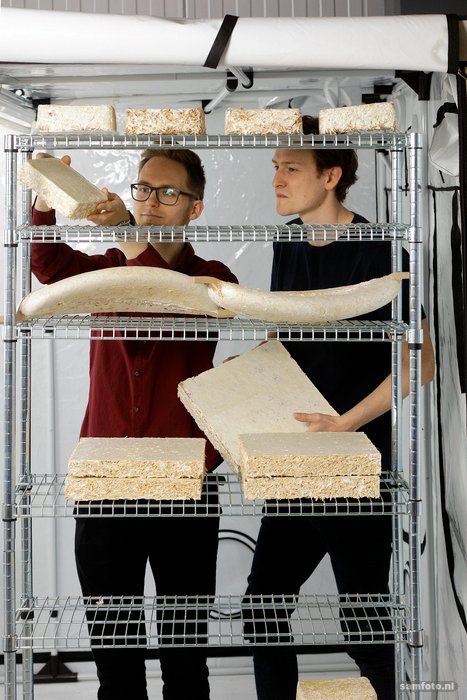The firm: Fairm
They were each taking a completely different degree programme, yet came into contact with the same material. Now TU Delft alumni Mark Postel and Joost Vette are working together to make the construction sector more sustainable.
We use solid-state fermentation with a fungus to create circular applications for the construction industry from biomass,” says Architecture graduate Marc Postel, pointing to a glass jar containing dried chips from a tomato plant. “In layman's terms you could say we are making tempeh with the properties of expanded polystyrene.” Together with Industrial Design Engineering graduate Joost Vetter, he launched the start-up Fairm.
In their office and lab in The Hague, the two men are carrying out research on mycelium – a filamentous network of hyphae – that acts like a sort of glue and joins plant remains together, for example. They have now succeeded in using this to make panels which can replace rockwool and expanded polystyrene. “Two materials that are widely used in internal and external construction, even though they have a relatively large carbon footprint.” It is reducing this carbon footprint that motivates them. “Our main goal is to have a positive impact on the environment.”
It was their shared interest in mycelium that brought Vette and Postel together in 2018 despite their different academic backgrounds. They both encountered mycelium during their degree programmes. They saw that research had been carried out around the world for over ten years, but it generally remained at the same level. Vette: “The only thing you can buy from this material right now is a vase or maybe a sculpture. We want to make real steps forward and get this material ready for large-scale applications.”
Company: Fairm (previously Fungalogic)
Founders: Marc Postel and Joost Vette
Degree programme(s): Building Technology and Integrated Product Design
Products: Fairm-Foam: 100% natural and circular pressure-resistant insulation material
Founded in: 2020
Employees: 2
Turnover: As yet negligible
In five years' time: “Rolling out a million square metres per year, making natural the new normal for interiors.”
And that is a real challenge. Fairm's products are already used in system ceilings, for example, as partitions between desks or as wall materials in telephone cubicles, but Postel en Vette have not yet been able to move on to affordable large-scale production. “Right now we know the parameters for small-scale production, but for large-scale production they are completely different. So now we are looking for partners who want to buy the product on a large scale as well as join in the production process.”
Does the construction sector need such a product? Postel thinks it does. “Everything has to be made of concrete, glass or steel, and there's often a lack of a sustainable vision.” Yet they are seeing hopeful developments. “In countries such as Austria, Denmark and Germany, biobased building has become far more mainstream. And things are changing in the Netherlands too, as part of the circular economy concept.” Besides this, the people striking for the climate today are the businessmen and women of tomorrow. “That will really change the market from the inside out.”
Vette and Postel are convinced that ten years down the line, every new building will contain a little bit of Fairm. “We have the drive to prove that this is possible.”
